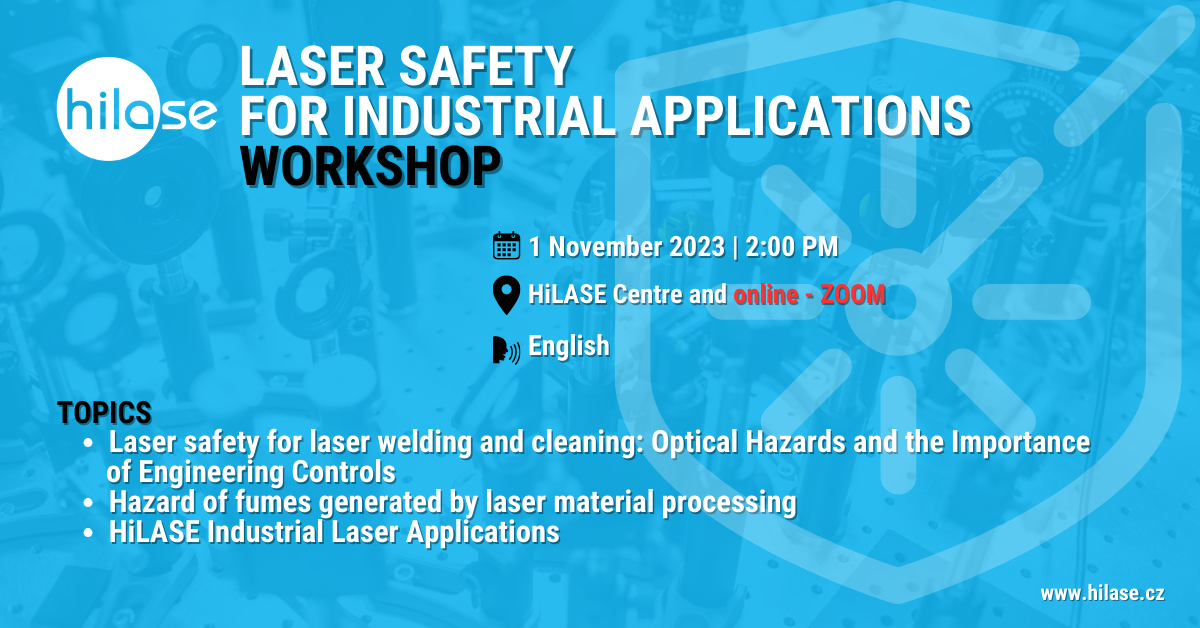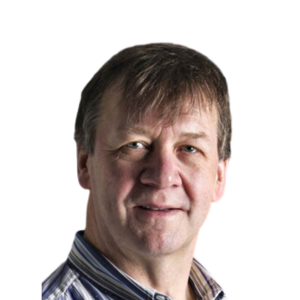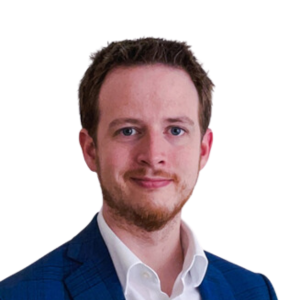We would like to invite you to a very special Laser Safety for Industrial Applications workshop with Professor John Tyrer and Dr. Lewis Jones from Wolfson School of Mechanical, Electrical and Manufacturing Engineering of Loughborough University, UK.

The workshop is part of the HiLASE Center’s “ Light at the Service of Society” activities.
AGENDA
13:40 – 14:00 Registration
14:00 – 14:15 Welcome, HiLASE Centre introduction | Martin Smrž
14:15 – 14:30 Advanced laser processing and manufacturing technologies | Jan Vanda
14:30 – 15:15 Hazard of fumes generated by laser material processing | Dr Lewis Jones
15:15 – 16:00 Laser safety for laser welding and cleaning | Professor John Tyrer
16:00 – 16:30 End & Networking
WHEN: 1.11.2023 od 14:00 – 16:30
WHERE: ZOOM: REGISTRATION LINK and Centrum HiLASE | Za Radnicí 828 | 252 41 Dolní Břežany | mapka
LANGUAGE: ENGLISH
PRICE: FREE
Managing Laser-Generated Fume Hazards: A Critical Aspect of Laser Safety
This presentation emphasises the significance of laser-generated fume hazards as one of the major limiting factors to laser safety. We’ll delve into the composition of these fumes, associated risks, and effective control measures, showcasing findings from recent research studies and lessons learnt from laser cutting in heavy industry and medical environments. Attend to learn how to protect workers and ensure a safer work environment in laser-based industries.TOPICS
Laser Safety in Welding and Cleaning: Optical Hazards and the Importance of Engineering Controls
Explore laser safety in welding and cleaning processes with a specific focus on the crucial role of engineering controls. This presentation will feature updates on safety standards from the convener of the IEC working group on High Power Lasers and Laser Systems. Laser applications in these fields are growing, but optical risks are paramount. Learn about the significance of engineering controls, including safety guarding, interlock systems, and how to adopt a proactive approach to laser safety.
Advanced laser processing and manufacturing technologies
Advanced laser processing and manufacturing technologies are related to the use of high-end lasers together with advanced sensors, feedback control, and machine learning. These include the functionalisation of surfaces using micro and nanostructures, increasing the durability of metal components and manufacturing components using hybrid technologies, etc. Functionalization means influencing surface properties, such as friction or biocompatibility, using clearly defined structures. It is also about extending the lifetime and safety of critical components by the controlled introduction of residual surface stresses. In terms of technology, we are talking about the use of LSP (Laser Shock Peening), LMM (Laser Micromachining) and LIDT (Laser Induced Damage Threshold). This also includes laser welding and 3D printing.

Professor John Tyrer FIMechE, FLIA
John Tyrer is a Professor of Optical Instrumentation and is a member of the Optical Engineering Research Group at Loughborough University where he has worked for over four decades. A Mechanical Engineer by education, John is a laser materials processing expert who has pioneered the use of computer-generated holographic optics for custom beam generation to improve material properties of laser processed parts. Along with his researchers, he has been actively pursuing the use of high efficiency holographic (diffractive) beam manipulation for a wide range of applications and has successfully commercialised technologies in this field.
John has a holistic approach to the hazard potential of laser systems. A long term interest has been fume from laser cutting and welding, he has been interested in mathematical/physical models bringing an understanding that fume carries real time information concerning the state of the laser process, this has led to novel process control and a methods of categorising laser fume hazards. For product laser safety compliancy it is essential to have a broad experience of component and product issues, this has been significant in the determination of hazards from CW & pulsed lasers. He is the co-convenor of Working Group 7 – High Power Laser Safety for the IEC TC 76 Laser Safety Committee.
25 years ago he set up a spin out company (Laser Optical Engineering Ltd - LOE) from his university research to provide the mechanism to exploit novel University work, through applied research, to enable high level product development. He recently helped set up a company for the testing of consumer motorcycle helmets The Helmet Inspection Company, which provides owners of helmets an inspection service to examine and report upon the structural integrity of the helmet and if it is still fit for purpose after being dropped etc. LOE has maintained the structural integrity of all composite lifeboats for the RNLI (440 lifeboats) over the last 25 years. They inspect the hull, decking and superstructure of every lifeboat as it manufactured, after significant impact damage and at refit to ensure the crew go to sea in unsinkable vessels, no lifeboat has been lost on his watch.

Dr Lewis Jones MEng PhD CEng MIMechE FHEA
Dr Lewis Jones is a Senior Lecturer in Laser Processing at the Wolfson School of Mechanical, Electrical and Manufacturing Engineering at Loughborough University (since 2022). Previous appointments include Lecturer (2016-2022) and research associate (2015-2016). He holds a PhD in Engineering Pedagogy (2016) and an MEng degree in Product Design Engineering (2011), both from Loughborough University. His research interests are focused on laser-based manufacturing processes to improve energy efficiency for low-carbon manufacturing. The emphasis of this work is to study laser-material interactions in non-conventional materials, identifying processes where lasers can have a disruptive change to current practice. Analysis techniques are multi-scale, investigating specific laser-material interactions, manufacturing process and material performance, and also the system level efficiency and integration of lasers. Supporting this research focus is the development of new knowledge related to laser safety as enabling expertise to remove barriers to use for laser applications. Lewis is a Chartered Engineer and a member of the Institution of Mechanical Engineers. He is a member of the BSI and IEC standards technical committee on optical radiation safety and laser equipment. He is a Fellow of the Higher Education Academy.








